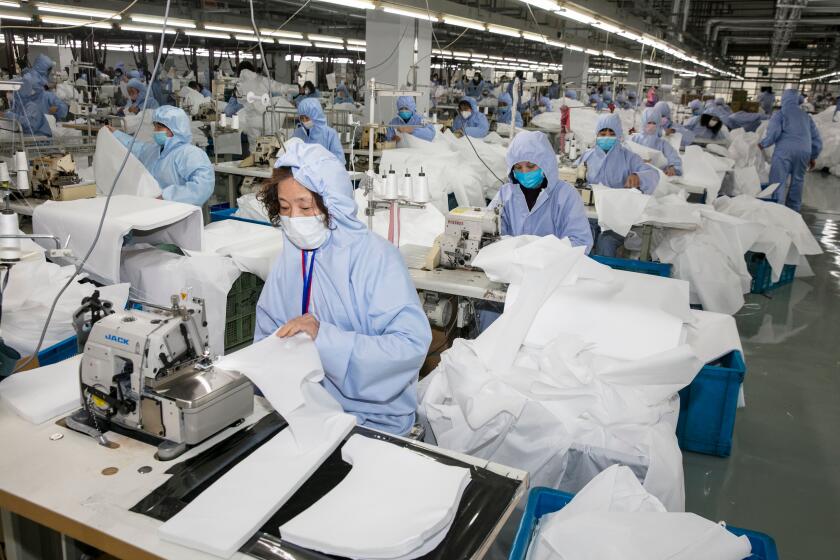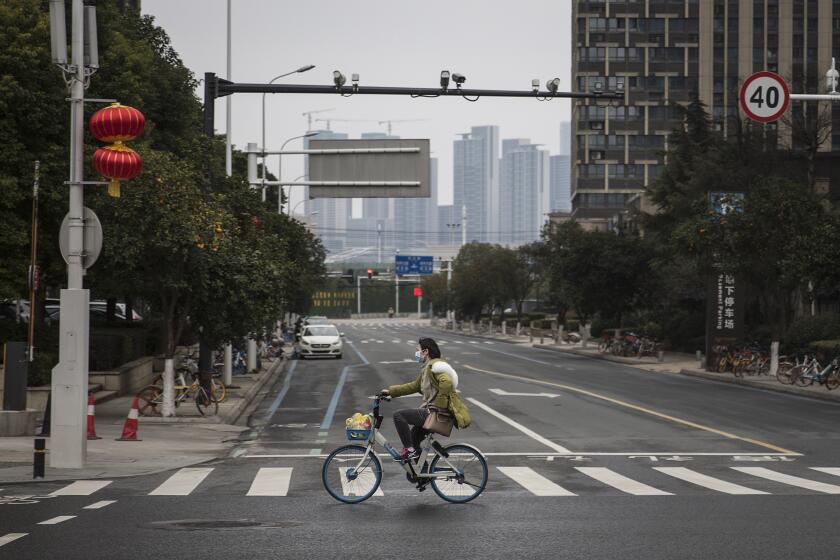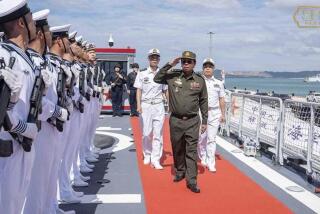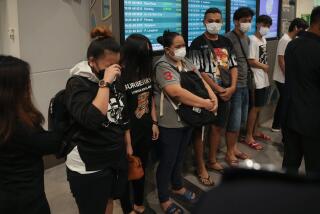Coronavirus fears rise after Cambodia welcomes stranded cruise ship
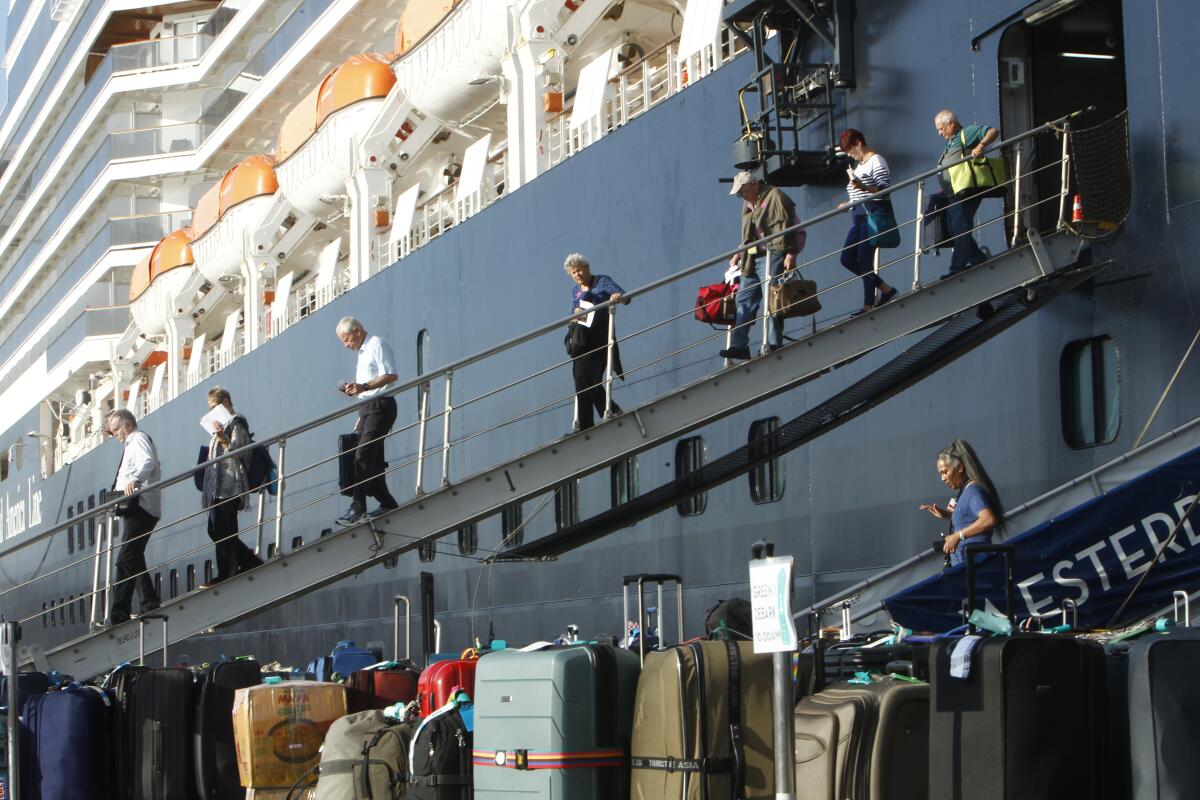
SINGAPORE — After allowing a stranded cruise ship to dock in Cambodia last Thursday, Prime Minister Hun Sen greeted disembarking passengers with warm handshakes and red roses.
It looked like a savvy photo op by the wily authoritarian, who instantly pleased both his closest ally, China, and his most powerful critic, the United States. Several countries had denied entry to the Holland America Line ship, the Westerdam, because of fears that passengers or crew could be carrying the novel coronavirus, although company officials said no one on board was infected.
The risks of the Cambodian leader’s gesture became apparent after an 83-year-old American passenger tested positive for the virus in Malaysia after she and hundreds of others left Cambodia en route to their home countries.
The announcement sent company officials, governments and medical experts scrambling to trace passengers who had dispersed to multiple countries — highlighting the challenge of containing a virus that often fails to trigger symptoms and is circling the globe.
“We are in close coordination with some of the leading health experts from around the world,” said Grant Tarling, Holland America’s chief medical officer. “These experts are working with the appropriate national health authorities to investigate and follow up with any individuals who may have come in contact with the guest.”
The American woman, who didn’t report feeling ill until after she left Cambodia, was in stable condition at a hospital in Malaysia, Holland America said Monday. Her 85-year-old husband has tested negative for the virus.
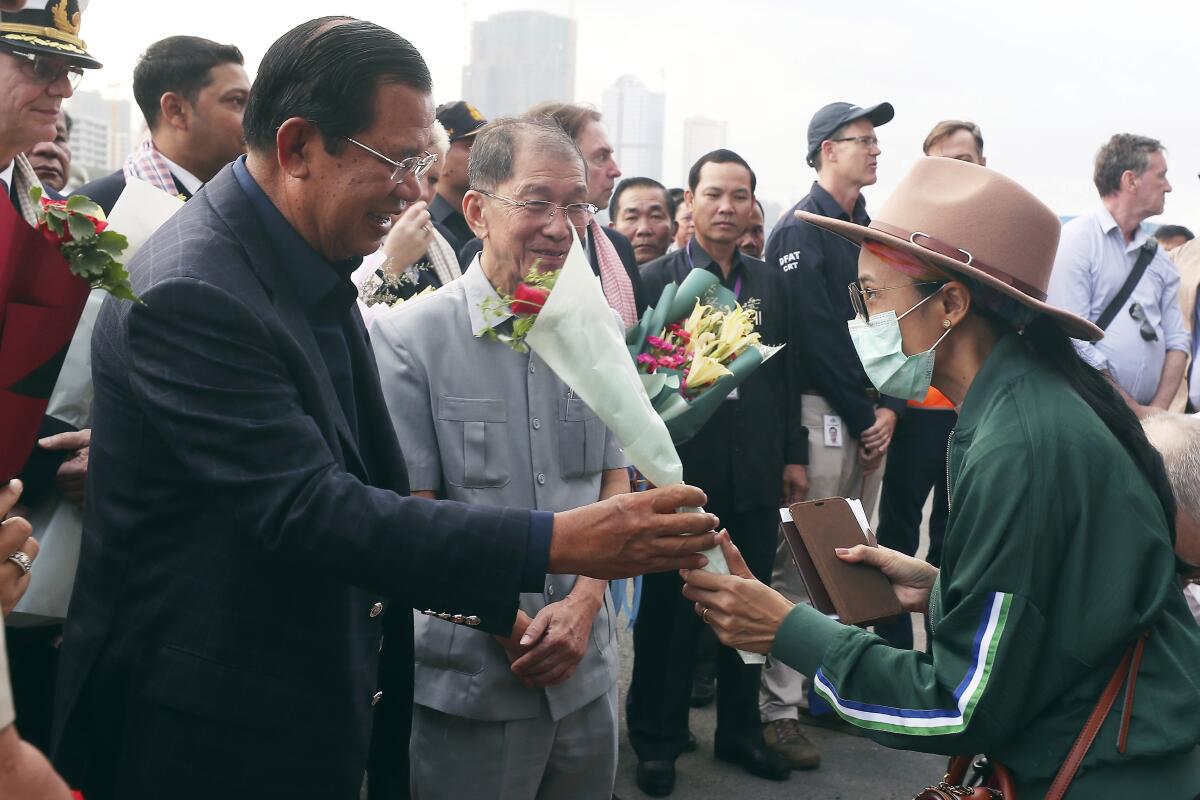
The company said that out of 2,257 passengers and crew members — including more than 650 Americans — only 20 reported feeling ill during the voyage and were tested for the virus. All tests came back negative. Hundreds of passengers disembarked at the port of Sihanoukville without being screened.
“Obviously in hindsight, this was a mistake,” said Charles Chiu, a professor of infectious diseases at UC San Francisco.
Chiu said that more precautions should have been taken in Cambodia given that the epidemic is in its early stages and can still be controlled. The crowded spaces and communal facilities on cruise ships make it easy for disease to spread among passengers. On the Diamond Princess cruise liner quarantined off of Japan, 454 people have tested positive for the coronavirus.
“Now that the passengers have either gone home or continued traveling in other countries, this only magnifies the global public health challenge of tracking and performing contact tracing for each and every one of the passengers,” Chiu said of the Westerdam. “Self-quarantine measures for 14 days would need to be rigorously enforced to prevent spread by anyone else who may have been infected.”
Thailand said Monday that for 14 days it wouldn’t let in anyone who had been aboard the Westerdam. Malaysia blocked further arrivals. Singapore placed two nationals who had returned from the cruise in a government quarantine facility and said it wouldn’t allow any other passengers into the country.
Passengers temporarily stopped disembarking from the Westerdam, and those who were in hotels were asked to stay in their rooms until they were tested for the virus and cleared.
Christina Kerby, a passenger from Alameda, Calif., who had been tweeting updates about her trip, disembarked and flew on Saturday to Cambodia’s capital, Phnom Penh. That evening, she gleefully posted pictures of her dinner of seafood and beer at a local bar, Nelsons.
The next morning, she said Cambodian health officials had asked passengers to stay in their rooms “pending further health screenings.”
“I left the hotel for a few hours on Saturday before I knew the extent of our situation,” Kerby tweeted Monday. “I deeply regret if I’ve inadvertently put anyone at risk.”
All passengers in Phnom Penh were tested for the virus, and no new infections had been reported as of Monday evening, according to Holland America. Those who were virus-free were able to travel home. About 1,000 people — mostly crew members — were still being screened aboard the ship.
More than 73,000 people worldwide have been infected with the coronavirus since it surfaced in December in the central Chinese city of Wuhan. Although the vast majority of cases have occurred in China, infections have appeared in more than two dozen countries, showing how the virus has spread silently through global travel.
The deadly coronavirus outbreak is hurting scores of companies in California and nationwide that depend on Chinese production and consumer spending.
“It’s a gamble Cambodia was making in allowing Westerdam to dock,” said Ou Virak, president of Future Forum, a Cambodian think tank.
Still, he praised Hun Sen’s decision on humanitarian grounds, saying that many other countries were reacting to the outbreak with “hysteria.”
The cruise liner had been at sea for two weeks and turned away by ports in at least five countries, including the U.S. territory of Guam, after concerns were raised that travelers could have been exposed to the virus from the journey’s origin point of Hong Kong. The ship was reportedly running low on supplies when the Cambodian government granted it permission to dock in Sihanoukville.
Hun Sen had several reasons to be hospitable. China is his country’s No. 1 trading partner, and from the outset the Cambodian leader has played down the threat of the virus.
He has opted not to evacuate Cambodian nationals from Wuhan, and he declined to wear a mask to guard against infection — even threatening to boot journalists from a news conference if they failed to follow his lead.
Pakistan has resisted calls to evacuate several hundred students from the virus-hit city of Wuhan, a decision that hinges on health as well as politics.
“What is more terrible than the epidemic is the panic itself,” Hun Sen told Chinese leader Xi Jinping during a visit to Beijing this month.
“People will of course question whether Hun Sen is doing this under pressure from China or of his own accord,” Ou Virak said. “I think it’s a combination of both.”
Allowing the ship to dock also deflected attention from a diplomatic blow Hun Sen suffered last week, when the European Union partially suspended Cambodia’s trade privileges, citing serious violations of civil, political and labor rights.
President Trump hailed “the beautiful country of Cambodia” and tweeted, “The U.S. will remember your courtesy.” The U.S. Embassy’s social media accounts have been full of praise for the Cambodian government, a departure from recent years, when the State Department has sharply criticized Hun Sen’s moves to ban opposition parties, silence independent media and block public assemblies.
“The close, positive, and public collaboration between the Cambodian government and the U.S. Embassy on the docking has ultimately turned this into something of a high point,” said Bradley Jensen Murg, assistant professor of political science at Seattle Pacific University.
Some Cambodians were worried about possible exposure to the virus. Several journalists who covered the arrival of the passengers said they were isolating themselves, although none reported showing symptoms.
Cambodian officials continued to play the cheerful host. The governor of Phnom Penh on Monday took some passengers on a bus tour of the city. Hun Sen said he wanted to throw them a party.
The country had reported one coronavirus infection before the Westerdam, but some Cambodians are skeptical of that figure given a huge volume of Chinese travelers, a weak health system and the virus’ ability to evade detection.
Paul Ananth Tambyah, president of the Asia Pacific Society of Clinical Microbiology and Infection, said Cambodia and Malaysia played their roles and now other countries would have to track the ship’s passengers.
“I think that this was a very difficult decision, as keeping the ship at sea or in the harbor is not a viable option,” Tambyah said. “Someone has to take the passengers ashore and send them somewhere else.”
More to Read
Sign up for Essential California
The most important California stories and recommendations in your inbox every morning.
You may occasionally receive promotional content from the Los Angeles Times.
